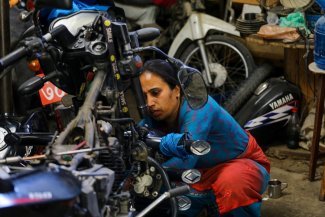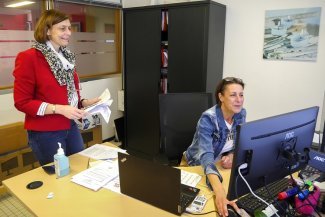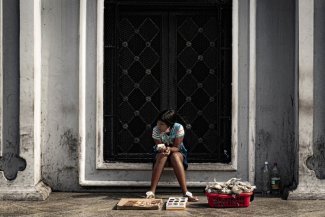Egyptian women prisoners do sewing work while serving their sentences at al-Qanatir women’s prison in Qalyubia province, north of Cairo (December 2020).
“What are you accused of?”
“A debt of 35,000 Egyptian pounds.”
“And you’ve been sentenced to three years in prison? The reason for the debt?”
“My daughter’s marriage.”
These were the answers given by Iman*, a divorced housewife and mother of five, when she visited the Sawaed Foundation, a charitable NGO in ‘10th of Ramadan’ (Al-Ashir min Ramadān), a city north of Cairo. On 14 January 2023, the 48-year-old woman went to the foundation to ask for help, wearing an old black djellaba and a veil covering her face to hide her identity. Iman has been wanted by the police for over six months.
In June 2022, she was sentenced in absentia by a court in the Sharkia Governorate, in the Nile Delta, for failing to pay back a debt amounting to the equivalent of €1,100, for over a year. Since the verdict, Iman has been hiding in her neighbours’ homes to escape the regular police raids.
“We receive about 50 cases like Iman’s every month,” Rabab Mansour, general secretary of the Sawaed Foundation, tells Equal Times. For the past five years, the NGO has been trying to raise money to help the Gharemat, women in debt, who have been condemned to prison in Egypt. “After receiving the cases, we try to offer them legal support from our lawyer and launch fundraising campaigns, especially on social media, to repay the women’s debts and enable their release,” she adds.
While Iman may have the good fortune of being on the list of women helped by this small NGO, it is too late for the tens of thousands of women already put behind bars for the same reason.
According to the figures announced by the state in March 2021, there are now almost 30,000 Gharemat in prison, although NGOs suggest the figure is much higher, given the difficulty of conducting a full census throughout the country.
Based on official estimates, the Gharemat currently account for as much as 25 per cent of Egypt’s prison population, the second largest category after political prisoners. Most of these women are sentenced to between three and 16 years, according to a study published in May 2021 by the Forum for Development and Human Rights Dialogue (FDHRD), an independent Egyptian NGO, which estimates the number of women in prison for debt at 35,000.
“Most of the women in debt are from villages and are female heads of households who borrow money to get their daughters married. Others take on debt to buy medicines, to pay for surgery or because they are in urgent need of money,” explains Mansour. “Among those that have come for help is a woman who was sentenced to two years for failing to pay back a debt of EGP6,000 (about €380).”
Prisoners of poverty
The Gharemat phenomenon illustrates how women are the primary victims of poverty in Egypt, as well as how large the gap is between men and women in terms of labour market access and financial autonomy. According to figures from the Central Agency for Public Mobilisation and Statistics (CAPMAS) published in March 2021, only 11.8 per cent of women of working age are in employment.
“The prisoners of poverty, as I would like to describe them, are a worrying phenomenon in Egypt, and highlight the economic hardships and pressures faced by women, especially female heads of households,” Noal Mostafa, director of the Children of Female Prisoners Association (Atfal al-Sagenat, in Arabic), tells Equal Times.
In Egypt, being a female head of household is a day-to-day struggle. According to the Egyptian Centre for Women’s Rights, a third of Egyptian families are under the sole responsibility of the mother. The vast majority of these women are unemployed, uneducated and receive no support from the state. Most of them have large families to feed and are alone in covering the exorbitant cost of their daughters’ marriages. Over 59 per cent of these female heads of household are illiterate. The figures published by CAPMAS at the end of 2021 confirm how very poor they are – a level of poverty that leaves them with no choice but to take on debt.
Illiteracy and lack of education are a boon for greedy creditors. “To finance their daughters’ marriages or borrow money, these women are forced to sign blank cheques made out to the creditors. If they cannot repay their debts, some creditors write exorbitant amounts on them, to intimidate the women and force them to repay the money or risk jail,” explains Mostafa.
“This phenomenon is linked to poverty but also to the marriage traditions that require the girls’ families to buy goods that are far beyond their means,” she adds.
Mostafa’s commitment to women in debt began in the 1990s. A journalist at the time, she went to the women’s prison in al-Qanatir, north of Cairo, to report on the situation. She was shocked to see women, most of them Gharemat, having to look after their newborn babies in prison. Her shock was all the greater when she realised that some of them were in prison for sums as modest as €200. This was what prompted her to set up a charity to provide assistance to indebted women and their young children through donations.
While Mostafa’s initiative has secured the release of hundreds of indebted women, she acknowledges that they are only escaping from a small prison into a larger one: society. “Women who come out of prison are heavily stigmatised. No one is willing to give them work, because they are on record as having committed a crime. Some have no alternative but to resort to illegal ways of making a living to feed their families, such as prostitution or begging,” she adds.
Mostafa has since decided not to wait until women end up in prison to pay their debts and is trying to tackle the problem at the source. With the help of grants and partnerships, in 2016, she set up a first clothing workshop to enable indebted women to work and pay off their debts. The project also offers sewing training to give women a fresh start after life in prison. A second workshop has since been opened and the association has managed to provide work or training to more than 6,000 indebted women.
A legal issue
The growing phenomenon of women in debt recently began to catch the attention of the Egyptian authorities. In 2018, the state-run Tahya Misr Fund launched the Egypt Without Debtors initiative, aimed at finding solutions for women and men in debt and in prison. In addition, Egyptian president, Abdel Fattah al-Sisi, has recently started to pardon small debtors on national holidays. But according to NGOs, the numbers are still very small, as the state is not seeking a radical solution to the problem.
For Nader Eissa, head of communications at the Children of Female Prisoners Association, the plight of women in debt is also worsening because of a law dating back to the late 1940s that allows for people to be imprisoned for not paying off their debts.
“Efforts to free some of the women in debt are not a solution. To really solve the problem, the state first needs to review the legislation that sentences indebted people to prison,” he tells Equal Times.
Since 2018, the Children of Female Prisoners Association has supported two parliamentary bills calling for the replacement of prison sentences for those in debt with civil punishment, allowing them to work for the state to pay off their debts. But these bills are left “in a drawer,” according to Eissa.
The economic crisis affecting Egypt since the outbreak of the Russian-Ukrainian war has worsened the plight of women in the country. In 2022, the Egyptian pound lost 50 per cent of its value and prices almost doubled, putting further pressure on female heads of households. “Nowadays, more and more women have to take on debts to pay for the basics needed for their families’ survival,” Eissa explains. “The situation is catastrophic for them. Some women can no longer even pay back a debt of one or two thousand Egyptian pounds (€30 to €60).”
The economic situation has also led to a fall in donations to NGOs that depend entirely on this funding. “It is harder to raise money to pay off women’s debts than in the past. Collecting 10,000 Egyptian pounds can now take over 10 days, compared to three days before. Unfortunately, our ability to help is greatly affected,” laments Mansour.












